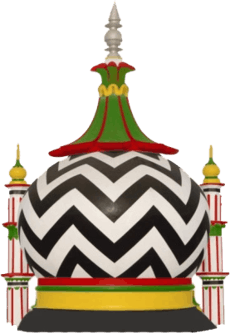Sunni Ittehad Council
Sunni Ittehad Council | |
|---|---|
The Sunni Ittehad Council is an alliance of Islamic political parties in Pakistan which represents about 160 million Pakistani followers of the moderate Barelvi (Sufi) school of Sunni Islam, the majority sect in Pakistan.[1] The current chairman of the main M faction is Sayyid Mahfooz Shah Sahib Mashadi and member parties of the Sunni Ittehad Council includes the Aalmi Tanzeem Ahle Sunnat of Pir Afzal Qadri (of Gujrat) and Jamiat Ulema e Pakistan. The Jamiat Ulema-e-Pakistan (JUP) was founded by Mohammad Abdul Ghafoor Hazarvi and is believed to be the most influential street power in Pakistan. Renowned for defending Pakistan Army, Sunni Ittehad Council is strictly pro-military.
The breakaway F faction that was established by Sahibzada Fazle Kareem and Haji Hanif Tayyib is now under the leadership of the controversial leader, Hamid Raza.
Actions
In December 2001, the Sunni Ittehad Council launched a countrywide "Difa-e-Pakistan campaign" to create public awareness against NATO attacks on Pakistan’s border military posts in Mohmand Agency, and decided to hold a "Condemn America Day" on the 23rd of that month.[2]
The US government website Usaspending.gov shows that the Sunni Ittehad Council received $36,607 from Washington in 2009. [3]
In September 2011, the Council reacted to rumors that the United States might invade Pakistan in an attempt to put down terrorist networks in the country. The Council issued a fatwa stating that jihad against the US would become obligatory were the country to encroach upon Pakistani soil, and urged the Pakistani government to prepare the nation for a holy war "in the way of God."[4]
On 12 October 2012, a group of 50 Islamic clerics in Pakistan issued a fatwā against the Taliban gunmen who tried to kill Malala Yousafzai. Islamic scholars from the Sunni Ittehad Council publicly denounced attempts by the Pakistani Taliban to mount religious justifications for the shooting of Yousafzai and two of her classmates.[5]
Division
Due to some political divisions, the Sunni Ittehad Council broke into two. One faction, led by Sayyid Muhammad Mahfooz Shah Sahib of Bhikki Shareef, declared that Sahibzada Fazal e Kareem and Haji Hanif Tayyab had been removed from their positions due to attempting to create an alliance with the Pakistan Muslim League Q without the prior permission of the member parties of the Sunni Ittehad Council, along with a host of other allegations.[6]
Sahibzada Fazal e Kareem therefore established a SIC-F while Sayyid Mahfzooz Shah Sahib made a SIC-Mashadi. Fazal e Kareem later died and the leadership of the SIC-F was given to Sahibzada Hamid Raza[7]
References
- ↑ http://www.asiapeace.org/article_of_month_may_2009.htm
- ↑ "Sunni Ittehad Council to launch Difa-e-Pakistan drive".
- ↑ http://www.dawn.com/news/687293/us-aided-pakistan-group-which-supported-extremists
- ↑ Ismail Khan, The Assertion of Barelvi Extremism. Hudson Institute: Current Trends in Islamist Ideology, vol. 12. Current Trends in Islamist Ideology.
- ↑ Jon Boone (12 October 2012). "Malala Yousafzai: 'fatwa' issued against gunmen". The Guardian. Retrieved 12 October 2012.
- ↑ http://dawn.com/news/767235/alliance-with-pml-q-triggers-rift-in-sunni-ittehad
- ↑ http://dunyanews.tv/index.php/en/Pakistan/200554-Sunni-Ittehad-Council-accepts-Taliban-challenge-of
www.facebook.com/SunniIttehadCouncil.Official
